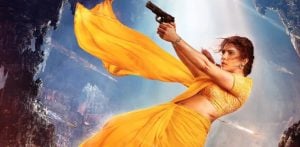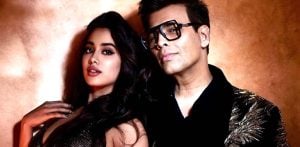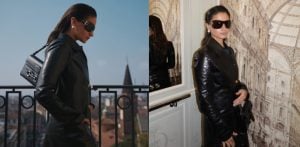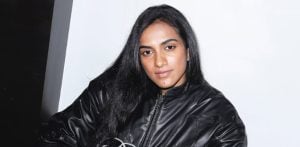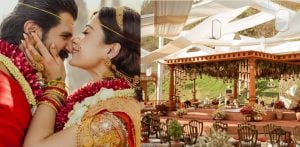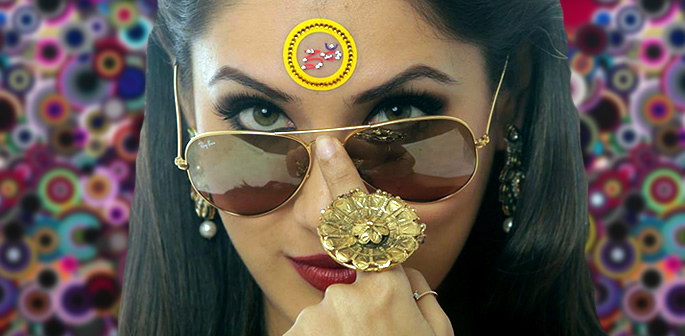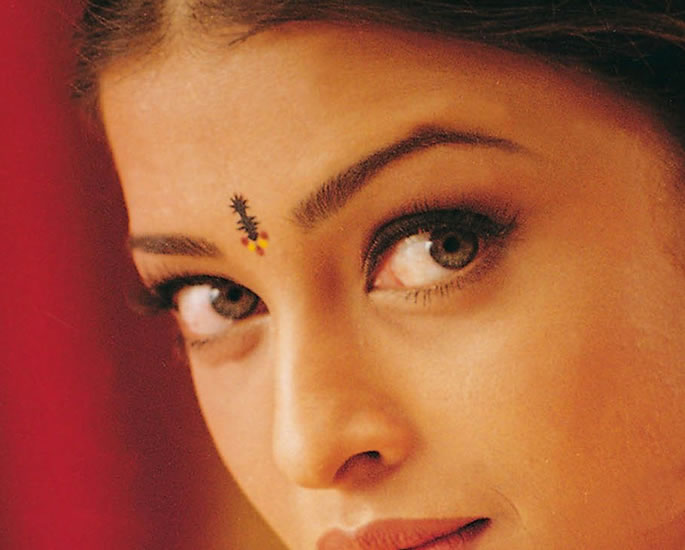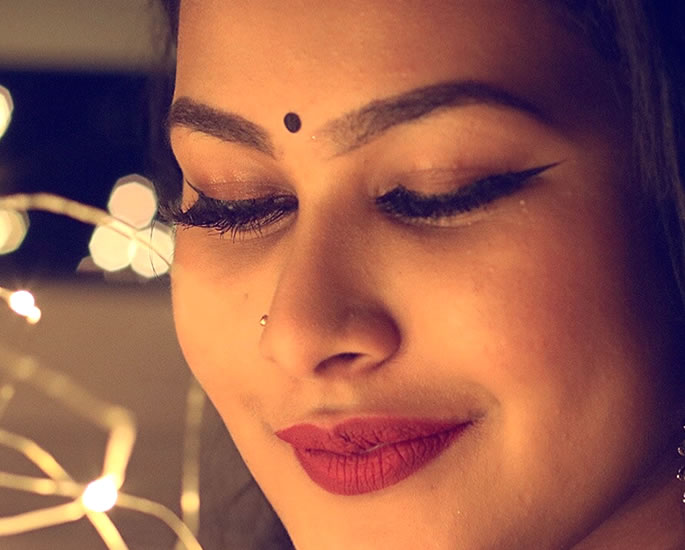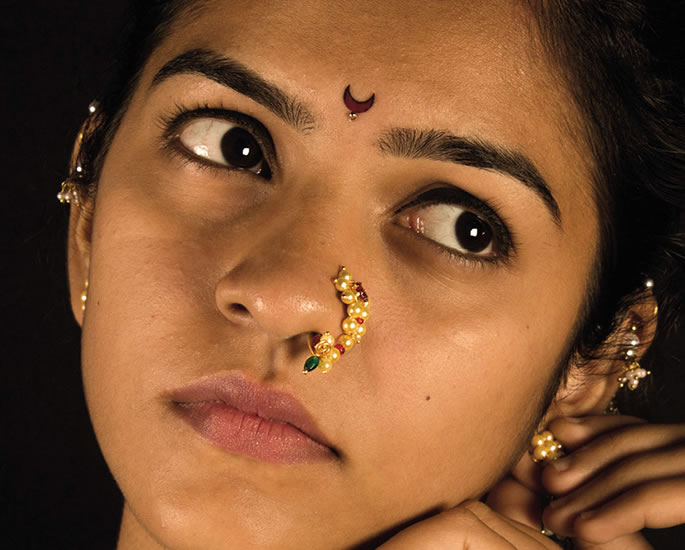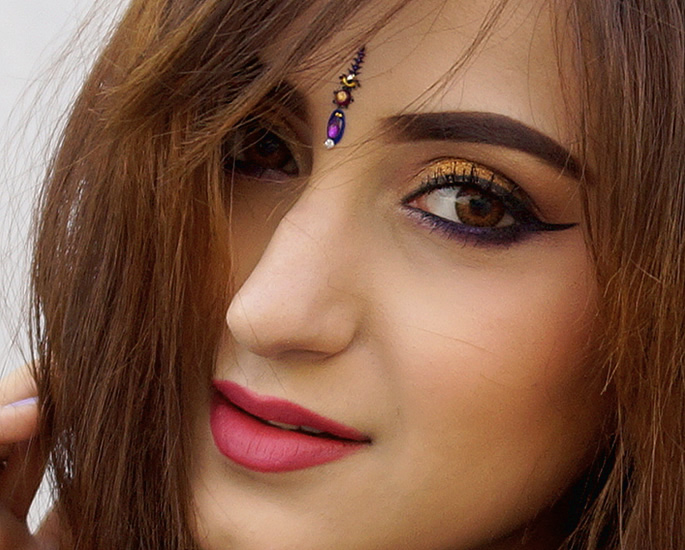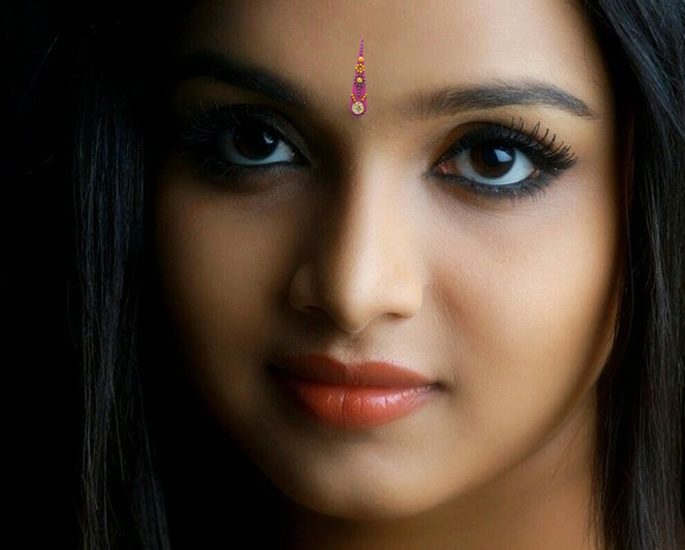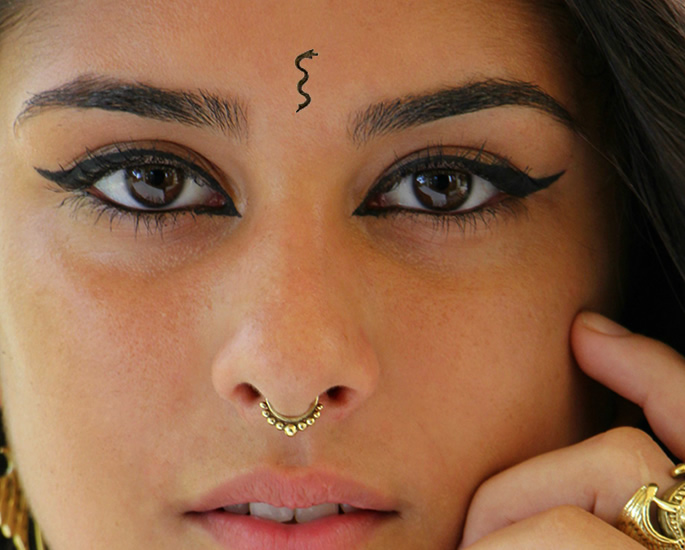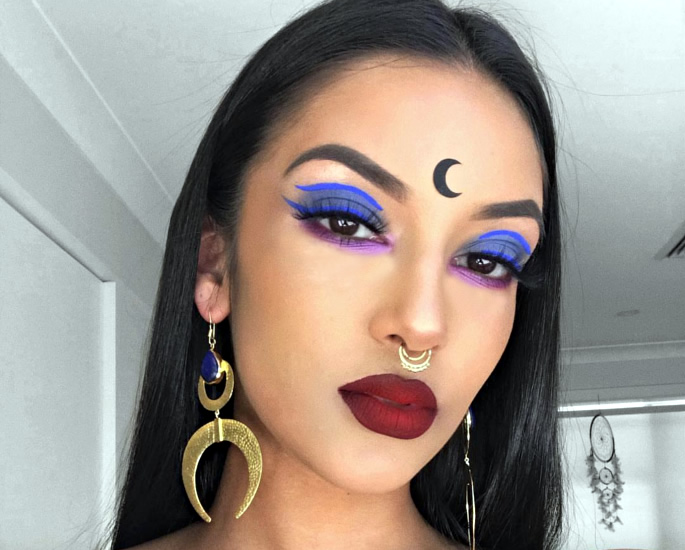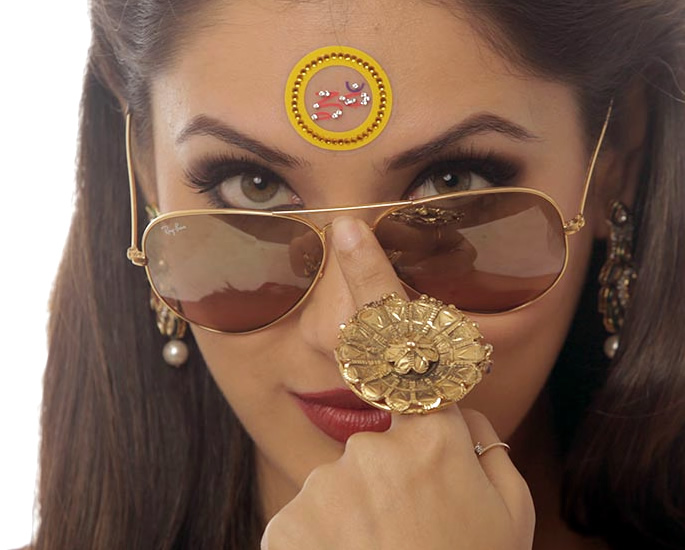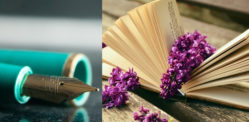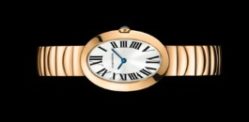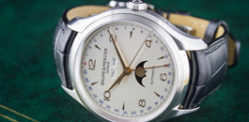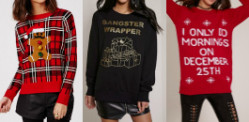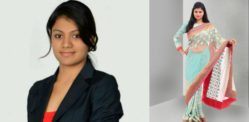This light-catching bindi is a failsafe favourite
Bindis are a prominent fixture of South Asian culture.
The origins of the bindi have roots in India, Pakistan, Bangladesh, Nepal, Bhutan and Sri Lanka.
Some believe the bindi is a spiritual reflection of the ‘third eye’ whereas others consider it the mark of a married woman.
As society moves and changes, the bindi has also changed in its meaning for young Desis, both in South Asia and elsewhere.
Many women use the bindi as a cultural fashion piece, as they now begin to embrace the bindi once more.
With western attempts to culturally appropriate the bindi, it is extremely important for Desis to reclaim this South Asian treasure.
DESIblitz unveils 20 different bindi styles, giving you helpful tips and stylistic points when choosing one to wear.
Thus, giving you all the information you need to help make bindis part of your everyday aesthetic.
Traditional Red Bindi
The most easily identifiable bindi available on the market is the traditional red bindi.
This bindi was previously worn, predominantly by married women.
However, now in modern times, it is perfectly acceptable and fashionable for unmarried women to adorn the red bindi also.
As the name suggests, it is usually of a sindoor red colour. It can be made using vermilion powder.
Red bindis look most striking when paired with either a red, cream or white outfit.
White and cream will allow the bindi to be more impactful due to the colour contrast.
The red bindi is a statement bindi, which draws in the attention of crowds.
Vertical Bindi
The vertical bindi, as the name suggests is vertically longer than most bindis.
It is worn in a thin line in the middle of the forehead.
This bindi was at the height of fashion, in the 80s and 90s.
With most women wearing a large vertical bindi at all and any functions.
Many Bollywood actresses were seen sporting this look also at the time.
This bindi suits oval-shaped faces, and is great for women with slightly larger or wider foreheads, as there is room for the bindi.
This is usually worn in black colour and it can also be decorated with glitters to add a stunning effect.
You can dust off this vintage look and wear it with a more cutting-edge saree or lehenga.
The juxtaposition of old and new will mould wonderfully.
Black Bindi
This is the simplest and most chic style of bindi.
A sophisticated look with any type of outfit. The black bindi is worn in the shape of a small dot.
This dot can be made with a marker, eyeliner, or even kajal. Meaning you can tailor this look to your own taste and specifications.
A slightly edgier bindi, it moves away from the loud and attention-seeking colourful bindis.
It’s subtle and seductive style is merit enough to be worn as a stand-alone accessory.
Kajal has been previously used in dots to ward away, ‘the evil eye’ so if you’re superstitious, this bindi can serve a dual purpose.
This bindi can be worn for formal wear or as an everyday bindi.
Due to its simplistic style, this bindi works on a casual level in addition to occasion wear.
Marathi Bindi
The origin and inspiration for this style of Bindi hails from, the Maharashtra state of India.
It is shaped in the form of a semi-circle, similar to the crescent bindi.
However, this bindi is always worn with the semi-circle facing downwards, not upwards or to the side, as is the case with a crescent bindi.
This is a cultural distinction which differentiates it from the crescent bindi which is more decorative.
It is worn quite commonly, especially by Marathi women.
The marathi bindi goes well with hair tied up in a coiffed up-do such as a bun.
Adding to this quintessential look would be to adorn your hair with jasmine or marigold flowers – perfect for wedding season.
This bindi offers a more delicate and cultural look, suiting a more traditional aesthetic.
Pair the marathi bindi with a saree and you can’t go wrong.
Long Bindi
The long bindi is a large vertical bindi which is heavily embroidered, with beadwork, gems, mirrors or stonework.
These bindis can have an intricate and wide bottom which includes more gems.
Or they can be narrow and thin, creating a sharp and intense look.
These bindis can be striking with both Indian or western attire.
A bright, long bindi paired with a black t-shirt is sure to be a distinct and powerful look.
You can also pair this bindi with any Indian attire, the long bindi is a surefire accessory, ideal for events.
Neon Bindi

Over the years, Indian fashion has surged in electric colour fusions. This colour pop trend has also trickled its way to bindis also.
A more eccentric extension of the traditional bindi, this should not be dismissed.
The neon bindi is often circular or oval in shape and comes in every bright and bold colour imaginable.
This would be the perfect colour injection for a summer festivity or wedding.
You can match it with your outfit, or use it as an accent point against a colour blocked outfit.
The choice is yours, if you are feeling particularly edgy you could also sport this bindi in your day to day.
It may raise an eyebrow or two, but with confidence, nobody will question your choice.
Oversized Bindi
The statement bindi of all bindis, this large bindi has been a hallmark of confident and firey South Asian women for decades now.
With actresses such as Rekha, Vidya Balan, Bipasha Basu and Anushka Sharma having used this oversized bindi to enhance their appearance.
This bindi is a favourite among stars, to give that ‘wow factor’ at events. The oversized bindi is a large bindi typically of red or black colour.
The oversized bindi was a favourite for television soap stylists in the 90s in India. Using an oversized black bindi to indicate the villainous woman, or ‘vamp’.
These oversized bindis look best with sarees.
We would recommend going light on accessories as the bindi will be the statement piece here.
Stone Bindi
The stone bindi, is stonework at it’s finest.
This light-catching bindi is a failsafe favourite for many a household during wedding season.
This bindi is made up entirely of stonework, be it a round bindi or a vertical bindi.
Stone bindis work particularly well with heavily embroidered outfits, be it a saree, lehenga or suit.
A stone bindi is the perfect accompaniment to any lavish item of clothing.
We recommend you match the stone to an accent colour in the outfit, so it doesn’t seem too forced or coiffed.
Metallic Bindi
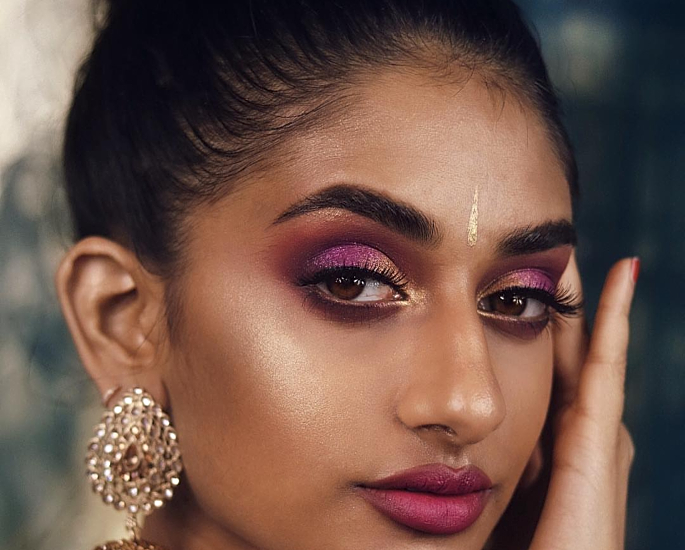
Another hot trend from the 90s, the metallic bindi found it’s footing back then and has remained since.
When we think of metallics the automatic assumption is silver or gold tones.
However, we always overlook the bronze.
Which is truly a shame as the rustic and earthy tones look wonderful against South Asian skin.
This trio of colours is the base of this bindi.
A metallic bindi is best matched with the embroidery of a lehenga.
This bindi is a showstopping favourite.
Diamond Bindi
All girls love a good diamond, right? This time we’re talking about the diamond bindi style specifically.
A diamond bindi refers to the clear jewelled bindi designs we’ve seen for many years.
This bindi, often incorporates a gem, which gleams and shines.
It can be large in size or very small. Dainty diamond bindis can go very well with casual looks, as they are not an overpowering accessory.
The larger types of diamond bindis would bode well at grand functions, as they are very eye-catching.
This bindi is a modern and elegant accessory.
Velvet Bindi
Within the last few years of Desi fashion, we have seen a resurgence of the plush and sensuous velvet fabric.
We have seen it in suits, blouses, sarees and lehengas.
But it’s also been used as a fabric for ready-made bindis.
Yes, that’s right, you can now tailor your bindi to your outfit!
The fabric is unlike that of other bindis on the market, giving the bindi a very unique and intriguing appearance.
They come in a variety of bright and dark colours. Some designs include decorations around them.
We recommend buying a pack with a range of colours ahead of the wedding season.
It’s guaranteed you, your mum, your sister and your massi will find one or more to match any of your looks!
Teardrop Bindi
Even its name sounds beautiful and poetic, the teardrop bindi refers to the shape of this bindi.
It has a rounded bottom and a sharp point at the top. This was the reigning style for bindis for many decades.
They are available in a variety of shades, with gemstones or even small beadwork.
An intricate and delicate bindi, it has a traditional feel to it.
It’s the type of bindi that would get a nod of approval from your grandmother.
However, it is also a non-mover in terms of fashion.
The teardrop bindi is always being used, be it in bridal fashion, runway or even film shoots.
This is a go-to favourite for many South Asian women.
Bridal Bindi
As the name suggests, this particular bindi design is related to brides and the bridal garb.
South Asian brides traditionally wear such bindi styles on their wedding day.
This design is aligned in such a way, that it forms a line across the upper-side of the eyebrows.
The addition of matha patti completes the look. As the two are usually seen to run in conjunction with one another, creating a thinner and more framed shape to the face.
The colour of the bindi is traditionally red, but with brides like Anushka Sharma opting for blush tones, the colour of this bindi can be changed.
We recommend buying a bridal bindi to pick up on the embroidery of your outfit, a metallic colour will bring a twist to this classic.
Geometric Bindi
Triangular shaped, square-shaped or even rectangular, these bindis are more out of the box.
Moving away from the circular imagery of the traditional bindi, the geometric bindi style experiments with the shape and format of a bindi.
Although this bindi is available in simple plain fabrics, we recommend incorporating a gemstone or mirrorwork into this shape of bindi.
Geometric shapes are fairly new to the scene, so you can get ahead of the crowd by wearing such a style.
We recommend adding this bindi to any outfit which is a print or pattern, the two will harmonise beautifully.
Designer Bindi
Designer bindis are also known as ’embroidered bindis’. These bindis can be worn in various shapes and colours. The size also varies from bindi to bindi.
Slightly pricier, these bindis are studded with pearls, diamonds, beads and stones. Glitter is also another substance used to enhance this style.
This is a bindi is best worn for weddings as it will pair well with anything, from a suit to a saree, making outfit changes less stressful.
Truly the embroidered bindi is beautiful with any garment.
Due to its elaborate styling, we would suggest this style of bindi be reserved for opulent occasions.
Star Bindi
This is a very common bindi design. Inspired by the beauty and shape of outer space.
The star bindi design can be very minimalist or adorned with glitters, beads and stones.
This bindi itself is usually on the smaller size scale.
It is not adorned with an additional border, it stands alone, shining as brightly as a star.
A star bindi would offset an all-black outfit wonderfully or it can be paired with a pure white look, as seen on Deepika Padukone.
Be sure to select a bindi that is a contrast colour such as a white, silver or gold, so it stands out.
Arrow Bindi
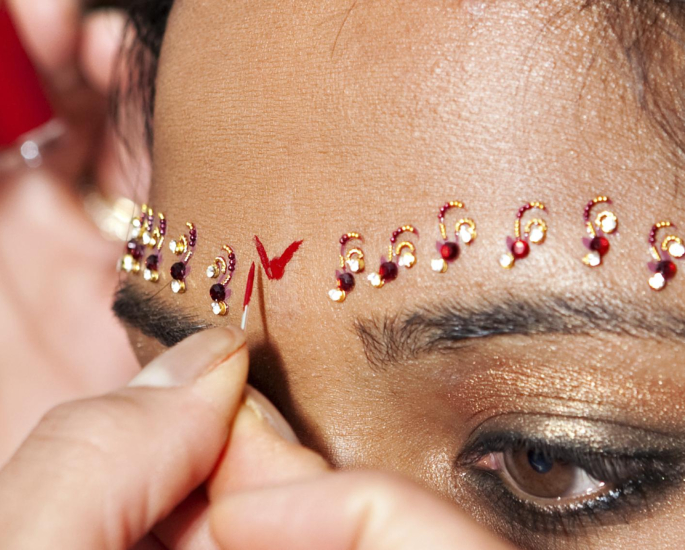
This bindi became popular specifically after television stars started adopting it on daily soaps.
It is in the shape of an arrow which is pointed downwards. Another DIY bindi, it is crafted using kohl or a liquid liner.
The fashion is to draw a downward pointing arrow, the gap and width of which are left to the wearer.
We appreciate this bindi design as it works well against bright and neon colours, creating an intriguing contrast.
To give it a more bridal touch you can use a red liquid liner and incorporate the arrow bindi into your wedding look.
Snake Bindi
Taking inspiration from the tales of ‘Nagin’s’ the snake bindi is hand painted with a liquid liner.
The bottom portion of the bindi normally highlights a snake’s body, with its many coils.
The bindi then stretches higher, serpentining along the way, to create the illusion of a snake in the bindi.
A trend that picked up in the 90s, this is a vintage bindi style which when worn will give a very unique and bold look.
Madhuri Dixit was seen using this style when she played Chandramukhi in Sanjay Leela Bhansali’s ‘Devdas’ (2002).
The actress highlights how this style of bindi can be used as an accent for an elaborate Desi look.
Crescent Bindi
Inspired by the partial shape formed by a crescent moon.
This design can be worn in many different ways.
You need only turn the bindi on its side or place it upside down and it will create a different and interesting shape.
This bindi can be worn with western attire to create a sharp contrast or with a monochrome palette Desi look.
The mystical idea of the crescent moon bindi gives any look a little whimsy and charm.
Unusual Bindi
The style of the unusual bindi is that of being eccentric and different.
The designs may encompass a mixture of other bindi designs. Or be completely outlandish and very different.
This style of bindi is a great accompaniment with western attire or a nice kurta and jeans combo.
This bindi is best showcased when you are looking for a bold finish to your accessories and it oozes experimentation too!
Some unusual bindi styles make use of other smaller bindis to form an overall pattern across the forehead.
You can style your hair in big waves or a sleek bun, this bindi goes with all styles.
These are the top 20 bindi designs which are very stylish, fashionable and great to try.
Though this list has a limit the possibilities for styling and shapes are endless.
With the constant changes in colour, shapes and textures these designs are constantly being innovated.
Leaving the wearer to become more creative with how they adorn themselves with the bindi.












